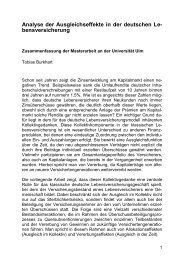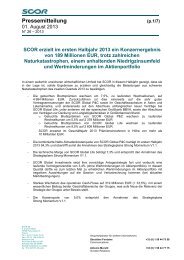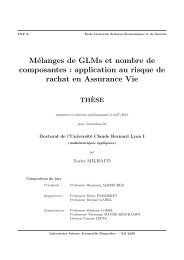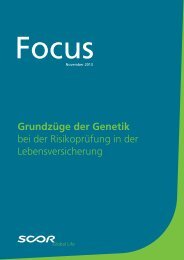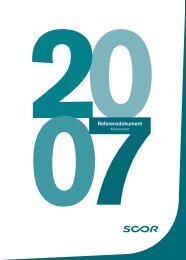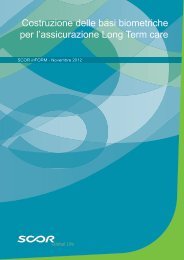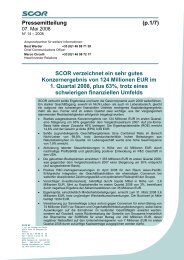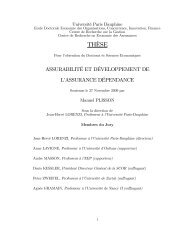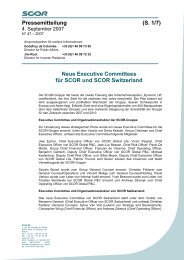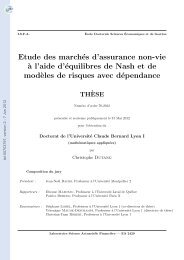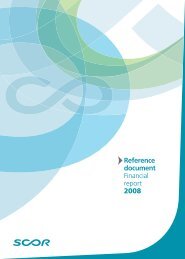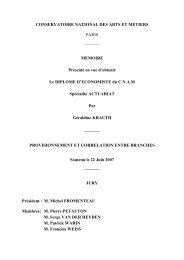4.4 Legal risk - Scor
4.4 Legal risk - Scor
4.4 Legal risk - Scor
You also want an ePaper? Increase the reach of your titles
YUMPU automatically turns print PDFs into web optimized ePapers that Google loves.
4.1.9 FINANCIAL RATINGS PLAY AN IMPORTANT ROLE IN SCOR’S BUSINESS<br />
Financial ratings are very important to all reinsurance companies, including SCOR, as ceding companies wish to<br />
reinsure their <strong>risk</strong>s with companies having a satisfactory financial position. The Group’s Life reinsurance activities and<br />
the Business Solutions (large corporate accounts underwritten essentially on a facultative basis and occasionally as<br />
direct insurance) business area in Non-Life reinsurance are particularly sensitive to the way its existing and prospective<br />
clients perceive its financial strength notably through its ratings. This is also true for the reinsurance treaties business in<br />
Non-Life in the U.S. and U.K. markets. Some of reinsurance treaties, including the assumed retrocession treaties that<br />
were entered into with AEGON companies in the course of the acquisition of the mortality reinsurance business of<br />
Transamerica Re (see “Section 5.1.5 – Important events in the development of the issuer’s business” for details on this<br />
acquisition), contain termination clauses triggered by ratings. Refer to “Section 4.1.10 – A significant portion of SCOR’s<br />
contracts contain provisions relating to financial strength which could have an adverse effect on its portfolio of contracts<br />
and its financial position”.<br />
In addition, if SCOR’s rating deteriorates, certain stand-by letter of credit facilities would require a higher level of<br />
collateralization and would increase the cost of the letters of credit. The timing of any review of the Group’s financial<br />
ratings by the rating agencies is also very important to its business since the Non-Life contracts and treaties are<br />
renewed at various set times throughout the year.<br />
Regarding the subordinated notes issued by SCOR SE, an equity credit has been assigned to certain notes in line with<br />
S&P existing methodology. A change in this methodology could lead to (i) a disqualification for equity credit of the notes<br />
and (ii) force SCOR SE to exercise the option that is offered in such case to redeem the notes. More information about<br />
subordinated debt appears in “Section 20.1.6 - Notes to the financial statements, Note 14 - Financial Debt."<br />
Some of SCOR’s cedants’ credit models or reinsurance guidelines depend on their reinsurers’ financial rating. If SCOR’s<br />
rating deteriorates, cedants could be forced to increase their capital charge in respect of their counterparty <strong>risk</strong> on<br />
SCOR. This could lead to a loss of competitive advantage which, in turn, could significantly impact SCOR’s revenues,<br />
net income, cash flow, financial position, and potentially, the price of its securities.<br />
4.1.10 A SIGNIFICANT PORTION OF SCOR’S CONTRACTS CONTAIN PROVISIONS RELATING TO FINANCIAL<br />
STRENGTH WHICH COULD HAVE AN ADVERSE EFFECT ON ITS PORTFOLIO OF CONTRACTS AND ITS<br />
FINANCIAL POSITION<br />
Many of SCOR’s reinsurance treaties, notably in the U.S. and in Asia, and also increasingly in Europe, contain clauses<br />
concerning the financial strength of the Company and/or its operating subsidiaries having the contracts and beneficiating<br />
from the Group rating, and provide for the possibility of early termination for its cedants if the rating of such subsidiaries<br />
is downgraded, or when its net financial position falls below a certain threshold, or if it carries out a reduction in share<br />
capital. Accordingly, such events could allow some of SCOR’s cedants to terminate their contract commitments, which<br />
could have a material adverse effect on its revenues, net income, cash flow, financial position, and potentially, on the<br />
price of its securities.<br />
In the same way, many of the Group’s reinsurance treaties contain a requirement for it to put in place letters of credit<br />
(“LOC”) provisions, if the financial strength rating of the Company and/or its subsidiaries subsidiaries having the<br />
contracts and beneficiating from the Group rating deteriorates, the cedant has the right to draw down on a LOC issued<br />
by a bank in SCOR’s name.<br />
Banks providing such facilities usually ask SCOR to post collateral. Its value retained by the bank, which can be different<br />
from the market value since it includes haircuts, is at maximum equal to the amount of the LOC facility. In the case of a<br />
LOC being drawn by a cedant, the bank has the right to request a cash payment from this collateral, up to the amount<br />
drawn by the cedant. It enforces by offsetting the collateral the Group posted to such bank.<br />
In the case of a large number of LOCs being drawn simultaneously, SCOR could encounter difficulties in providing the<br />
total amount of required cash or fungible assets, i.e. exposing it to a liquidity <strong>risk</strong>.<br />
Moreover, some of SCOR’s facilities contain conditions about its financial situation which, if not met, constitute a default<br />
and might result in the suspension of the use of current credit facilities and/or a prohibition on obtaining new lines of<br />
credit or result in the need to negotiate new LOC facilities under adverse conditions, which could have an adverse effect<br />
on its revenues, net income, cash flow and financial position, and potentially, the price of its securities.<br />
For more details about the Group’s lines of credit, refer to “Section 10 - Capital resources.”<br />
4.1.11 OPERATIONAL RISKS, INCLUDING HUMAN ERRORS OR COMPUTER SYSTEM FAILURE, ARE INHERENT<br />
IN SCOR’S BUSINESS<br />
Operational <strong>risk</strong>s are inherent in all businesses including SCOR’s. Their causes are multiple and include, but are not<br />
limited to, poor management, employee fraud or errors, failure to document a transaction as required, failure to obtain<br />
required internal authorizations, non-compliance with regulatory or contractual obligations, information technology (“IT”)<br />
system flaws, poor commercial performance or external events.<br />
The failure to attract or retain the necessary personnel could have a material adverse effect on SCOR’s results and/or<br />
financial condition. As a global financial services organization with a multi-centric management structure, the Group<br />
28



